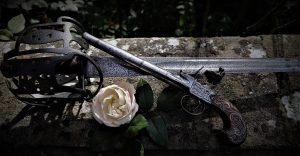IF THIS SILENT STEEL COULD SPEAK…
16 Apr 2019

… it would speak of smoke and sleet, more winter than spring, and the northeast wind slashing, and the drums on an April morning, and the fierce defiance of the pipes. It would speak of the cold and the hunger and the fear and bone-weariness of men soaked to the skin under the weather’s bitter onslaught, and the sleet suddenly a deadlier hail of iron as they wait for orders. It would remember the screams of fury and frustration as finally, too late, armed men break into the charge across a sodden, broken moor, the name of which will soon become a blood-soaked synonym for infamy. The sword remembers the screams of the dying.
If this steel could speak it would remember its forging, and the beginning of things: the wild hopes and passions and burning, impossible dreams. It may remember the end: escape, ignominy, secrecy, proscription. It may have lain hidden for years as the dreams died, awaiting a recall that never came. Its blade, notched with impact, remembers blood, and blood spilled on that day and on that moor remains an ineradicable stain. Down the long centuries, against the vast sweep of an island’s common history, these wounds were inflicted, as it were, only yesterday, and are, perhaps, mortal.
To some it is given to hear the voices of the past, to walk among its ghosts.
I hold this sword on an April morning, with only birdsong and sunlight and the ticking of a clock to disturb the peace of my house, and in the quietness of my mind it speaks.
Let its truths be told.
